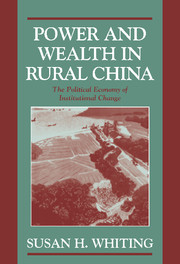Book contents
- Frontmatter
- Contents
- List of Maps, Figures, and Tables
- Preface
- 1 Explaining Institutional Change
- 2 The Maoist Legacy in Rural Industry
- 3 Incentive Structures and Local Cadre Behavior
- 4 Incentives, Constraints, and the Evolution of Property Rights
- 5 Stasis and Change in Extractive Institutions
- 6 Credit Allocation and Collective Organizational Structures
- 7 The Political Economy of Institutional Change
- Appendix
- Bibliography
- Index
1 - Explaining Institutional Change
Published online by Cambridge University Press: 30 September 2009
- Frontmatter
- Contents
- List of Maps, Figures, and Tables
- Preface
- 1 Explaining Institutional Change
- 2 The Maoist Legacy in Rural Industry
- 3 Incentive Structures and Local Cadre Behavior
- 4 Incentives, Constraints, and the Evolution of Property Rights
- 5 Stasis and Change in Extractive Institutions
- 6 Credit Allocation and Collective Organizational Structures
- 7 The Political Economy of Institutional Change
- Appendix
- Bibliography
- Index
Summary
AMID predictions that the opening years of the new millennium will usher in a “Chinese century,” we are confronted daily with con-flicting images of the Chinese state – at once predatory and developmental, weak and strong. Indeed, the “reach of the state” is an issue of vigorous debate not only among students of Chinese politics but also among students of comparative politics. The debate centers on the capacity of the state to promote the generation of wealth and to command some portion of that wealth for state purposes. While arguments about state strength or weakness pervade the literature, they are, by their very nature, inconclusive. What the debate fails to capture fully is the extent to which state capacity changes over time and varies across policy arenas and geographic settings. Rather, the “reach of the state” ultimately depends on the nature of the institutions that govern the economy and society. This study moves beyond formulations of state strength or weakness and focuses the analysis on issues of institutional variation and change.
Institutional change is at the heart of the rapid socioeconomic transformation in China since 1978. With one of the fastest growing economies in the world at the beginning of the twenty-first century, China is simultaneously making the transition from agriculture to industry and from socialism to capitalism. This study examines changes in the institutions governing one of the most dynamic sectors of China's economy – the rural industrial sector.
- Type
- Chapter
- Information
- Power and Wealth in Rural ChinaThe Political Economy of Institutional Change, pp. 1 - 39Publisher: Cambridge University PressPrint publication year: 2000



